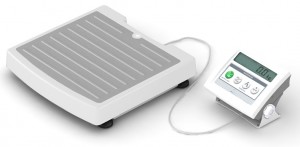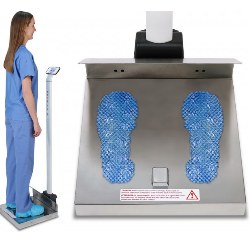In the world of healthcare, precision is paramount. Every decision, every diagnosis, and every treatment plan relies on accurate data. One might not immediately think of scales as the heroes of healthcare, but they do play a pivotal role in maintaining patient health and safety. From monitoring a newborn’s growth to administering medication with precision, electronic weighing scales are unsung heroes in the healthcare field. In this article, we’ll explore the vital importance of scales in healthcare and how they contribute to patient well-being.
Back in the day, we only had a couple of scale brands to choose from when it came to medical scales. That’s not the case these days, we have multiple brands of scales to choose from. A few of the brands of scales that we recommend are Seca, Rice Lake Healthweigh, Befour, Health-O-Meter Professional, and Detecto among others.

1. Precise Medication Dosage
Imagine a scenario where a patient’s life depends on the precise administration of medication. Now, picture a nurse or doctor relying on guesswork instead of a high quality precision calibrated scale. It’s a troubling thought. Scales in healthcare ensure that medications are administered accurately, down to the milligram. In some cases, this accuracy could be a matter of life or death, particularly when dealing with potent medications or vulnerable patients.
2. Monitoring Patient Health
In healthcare, monitoring changes in a patient’s weight can be a key indicator of their overall health. Rapid weight loss or gain can signal underlying issues, such as heart problems, kidney dysfunction, or malnutrition. Infant scales, handrail scales, and wheelchair scales are just a few examples of specialized equipment used to monitor patients’ weight accurately. By tracking these changes precisely, healthcare professionals can catch potential problems early and provide timely interventions.
3. Nutritional Assessments
Proper nutrition is fundamental to recovery and overall health. In hospitals and long-term care facilities, nutritional assessments are routine. These assessments, often conducted by dietitians or nutritionists, rely heavily on portion control scales to measure ingredients, portion sizes, and the nutritional content of food. Ensuring that patients receive the right nutrients in the right amounts is essential for their recovery and well-being.
4. Infection Control
Infection control is a top priority in healthcare settings. Scales can contribute significantly to this by reducing the need for direct contact with patients. Bed scales, for example, allow for the measurement of patients’ weight without physically moving them, minimizing the risk of cross-contamination. In an era where infection control is paramount, these accurate scales play a crucial role in maintaining a safe healthcare environment.
5. Accurate Diagnosis
Scales are indispensable tools for diagnosing various medical conditions. One prime example is the Body Mass Index (BMI), which is calculated using a person’s weight and height. A deviation from the healthy BMI range can be an early warning sign for conditions like obesity, malnutrition, or even eating disorders. With accurate measurements, healthcare providers can make informed decisions about patient care and treatment plans.
6. Maternal and Child Health
In the realm of maternal and child health, person weight scales are indispensable. For instance, pediatricians closely monitor a child’s growth to ensure they are hitting developmental milestones. Accurate measurements of an infant’s weight, length, and head circumference are vital in assessing their overall health and development. Similarly, during pregnancy, monitoring maternal weight gain is essential for both the mother’s and the baby’s well-being.
7. Precision in Surgical Procedures
Surgery is a highly precise field in healthcare, and medical scales are essential here as well. Whether it’s weighing organs for transplantation or ensuring that surgical instruments are correctly calibrated, digital scales are integral to surgical procedures. Any deviation from accuracy could have dire consequences for patients undergoing surgery.
8. Managing Chronic Conditions
Patients with chronic conditions like diabetes often need to monitor their weight closely. Scales that sync with electronic health records or mobile apps can help patients and their healthcare providers track changes in weight over time, allowing for more effective disease management. This data can be critical in adjusting treatment plans and preventing complications.
9. Pharmacy Compounding
Pharmacists play a critical role in healthcare by compounding medications to meet specific patient needs. Precision is non-negotiable in this field, as even a slight error in medication dosage can have severe consequences. Pharmaceutical weighing equipment ensure that each compound is prepared accurately, guaranteeing patient safety and treatment effectiveness.
10. Research and Clinical Trials
In the pursuit of new medical treatments and therapies, research and clinical trials are essential. Weighing scales are instrumental in these endeavors, helping researchers measure the precise dosage of investigational drugs and assess the impact of treatments. The accuracy of scales can make or break the success of a clinical trial, potentially affecting millions of lives.

Medical grade scales might not always take the spotlight in the healthcare field, but their importance cannot be overstated. From ensuring the correct dosage of life-saving medications to monitoring patient health, electronic scales play a vital role in the precision and accuracy of healthcare practices. The digital scales are the unsung, behind the scenes, items safeguarding patient well-being and contributing to the overall effectiveness of healthcare delivery. If you are interested in any of our various types of medical scales that we offer, be sure to contact our sales department (919) 776-7737 to discuss scale options and brands that we recommend.